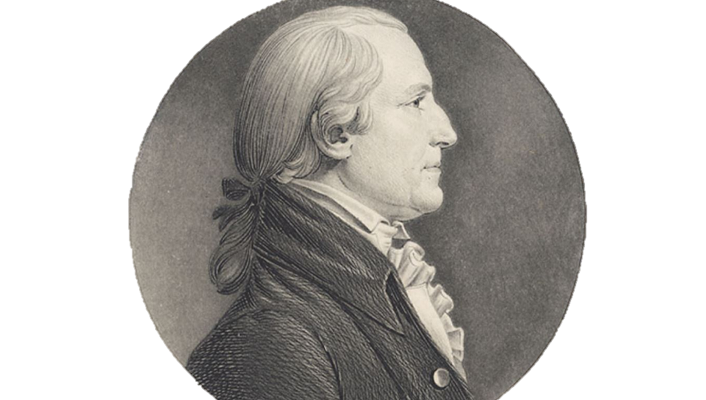On July 10, 1752, St. George Tucker was born. He wrote the first systematic commentary on the U.S. Constitution and was one of the most influential jurists and legal scholars during the formative years of the United States.
Tucker was born near Port Royal, Bermuda. His father, Col. Henry Tucker, was a prominent merchant. His grandfather on his mother’s side was a future chief justice of Bermuda.
Tucker moved to Virginia in the fall of 1771 to attend the College of William and Mary. He studied natural and moral philosophy under Reverend Thomas Gwatkin. At the end of 1772, he dropped out due to a lack of funds and took on an apprenticeship in the office of George Wythe, a prominent Virginia lawyer who mentored Thomas Jefferson and other influential Virginians.
In the spring of 1774, Tucker was admitted to the Virginia Bar and launched into law. But after the passage of the Stamp Act, many Virginia county courts closed, along with the General Court of Virginia. With few legal business opportunities in the colony, Tucker returned to Bermuda.
During the American War for Independence, Tucker initially got involved with a family-run smuggling business on behalf of the Patriot cause, helping move food and supplies between the colonies, the Caribbean and Europe. In the spring of 1779, he enlisted in the Virginia militia as a private. With his political connections, he was quickly commissioned as a major. Tucker fought in the battle at Guilford Court House, North Carolina, and suffered a bayonet wound to his leg. He was also later wounded by an exploding shell during the Battle of Yorktown while serving as an interpreter for French officers.
After the war, Tucker resumed his legal career and eventually become one of the most influential jurists in the United States. He served as a judge in the General Court of Virginia (1789–1804), the state Court of Appeals (1804–1811), and the U.S. District Court for the District of Virginia (1813–1825). He also served as the rector and a professor of law at the College of William and Mary where he revolutionized legal education.
In 1803, Tucker published a five-volume edition of Sir William Blackstone’s Commentaries on the Laws of England titled “Blackstone’s Commentaries: With Notes of Reference to the Constitution and Laws, of the Federal Government of the United States, and of the Commonwealth of Virginia.” It was the first major treatise on American law.
That same year, he also published “View of the Constitution of the United States with Selected Writings,” the first comprehensive commentary on the U.S. Constitution. The book became one of the country’s primary sources on constitutional law, informing the opinions of judges, lawyers and politicians for the next 50 years.
Tucker viewed the Constitution as a compact between sovereign states delegating limited power to the general government.
“[Federal] jurisdiction extends to certain enumerated objects, only, and leaves to the several states a residuary and inviolable sovereignty over all other objects.”
As historian Clyde Wilson put it, “His strongest point of insistence is on the necessity for governmental power to be restrained within specifically delegated limits.”
Tucker argued that since the federal government had “no existence but under the Constitution, nor any rights, but such as that instrument confers,” it could not wield any power “but such as is absolutely necessary for the performance of a duty prescribed and enjoined by the constitution.”
That being the case:
“The powers delegated to the federal government, are, in all cases, to receive the most strict construction that the instrument will bear, where the rights of a state or of the people, either collectively or individually, may be drawn in question.”
Tucker was also publicly opposed to slavery, an extremely radical position for a Virginian in the late 18th and early 19th centuries.
In 1796, Tucker published a pamphlet A Dissertation on Slavery: With a Proposal for the Gradual Abolition of it, in the State of Virginia. It was later appended to his edition of Blackstone’s Commentaries. Tucker wrote that the abolition of slavery was of “the first importance, not only to our moral character and domestic peace, but even to our political salvation.”
“Whilst America hath been the land of promise to Europeans, and their descendants, it hath been the vale of death to millions of the wretched sons of Africa. . .Whilst we were offering up vows at the shrine of Liberty…whilst we swore irreconcilable hostility to her enemies. . .whilst we adjured the God of Hosts to witness our resolution to live free or die. . .we were imposing on our fellow men, who differ in complexion from us, a slavery, ten thousand times more cruel than the utmost extremity of those grievances and oppressions, of which we complained.”
Tucker went so far as to submit his proposal for gradual emancipation to the Virginia Assembly. It was unsurprisingly, rejected.
Tucker died in 1827 after suffering a stroke.
